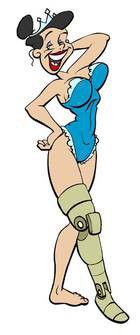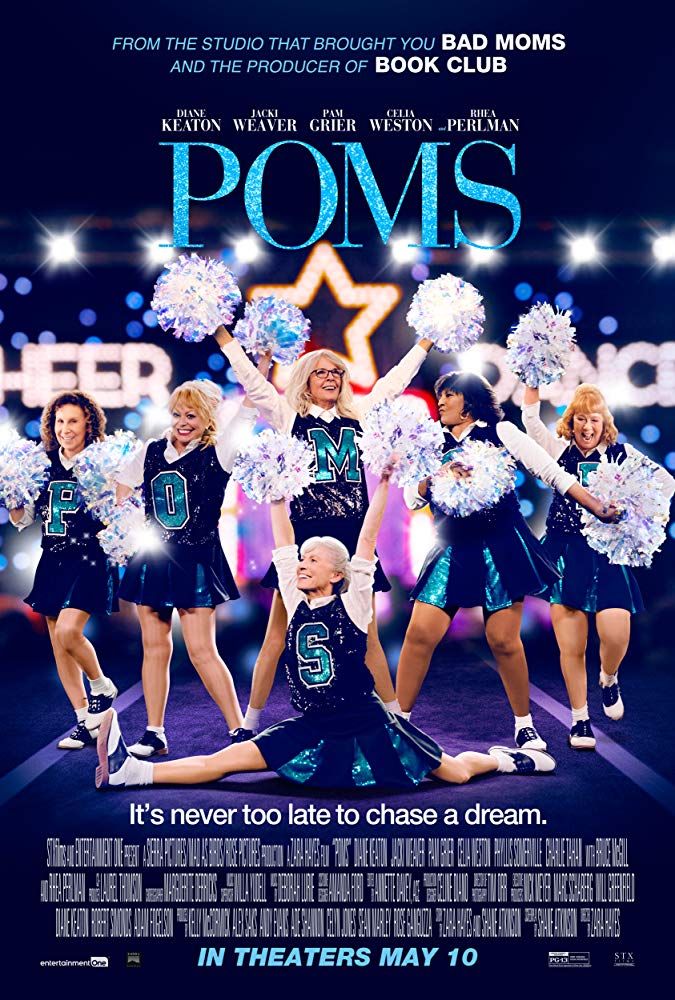
As a former high school cheerleader (being a geek and a cheerleader are not mutually exclusive, FYI), I admit to a soft spot for films that make me nostalgic for the squad life. While most movies in the rah-rah genre focus on contemporary teens and the angst that goes along with adolescence in the cutthroat cheer world, Zara Hayes’ latest feature POMS switches the narrative to women-of-a-certain-age of who want one last hurrah.
With Diane Keaton starring as the ringleader of the geriatric squad and members including Jacki Weaver, Pam Grier, and Rhea Perlman, POMS is a fun and often poignant look at women who refuse to let end of life issues get them down.
I recently had the opportunity to chat with Hayes to discuss the film. I hope you enjoy our interview!
Annette Kellerman: How in the world did you find out about the real Sun City Poms, and how did that inspire you to create this film?
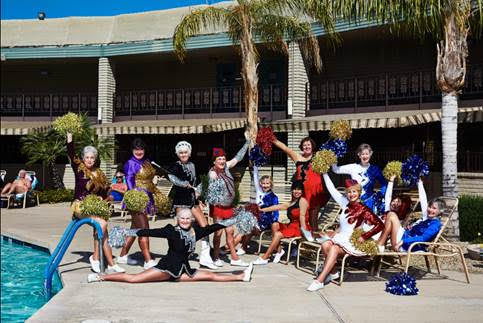
(real photo of Sun City Poms- 1970s)
Zara Hayes: Well, I was sitting of my sofa in London, about five years ago and flicking through the Sunday papers, and I saw these images of the Sun City Poms, and it was just like "What the hell is this, this is amazing." I sent the picture to my friends and kind of like, loved these images. And then contacted them to find out more. I was so intrigued by it and so kind of enticed by the idea. I've never heard of anything like it, and also it seemed like such a perfect way of reclaiming this cheerleading thing, which is a kind of bizarre and fascinating activity itself. Yeah, so it started from that.
Kellerman: You're more well known for documentaries with BATTLE OF THE SEXES, and DIAN FOSSEY and of course a variety of other projects that are mostly documentary style. Can you talk about the choice to do this as narrative versus documentary?
Hayes: Yeah, I thought that it had scale and scope. I initially was approaching it as a documentary, and I thought I could make a documentary about being a cheerleader in American. I actually contacted a few teams. There are a number of teams, not just the Sun City Poms, but around the country I spoke to a team called the Dome Divas in New Jersey and all these teams. I just had an instinct that if you can do this as a fictional story and it can be a movie, this story could stand up to that medium to be something that people would want to see in cinema. It felt like I had so many great elements in the reality that no one story felt like the killer story to tell in the documentary, but I couldn't get the idea out of my head. I knew I had to make a film about it. This is something people should be pay to see on a Saturday night at the cinema. That's how I felt, does that make sense?
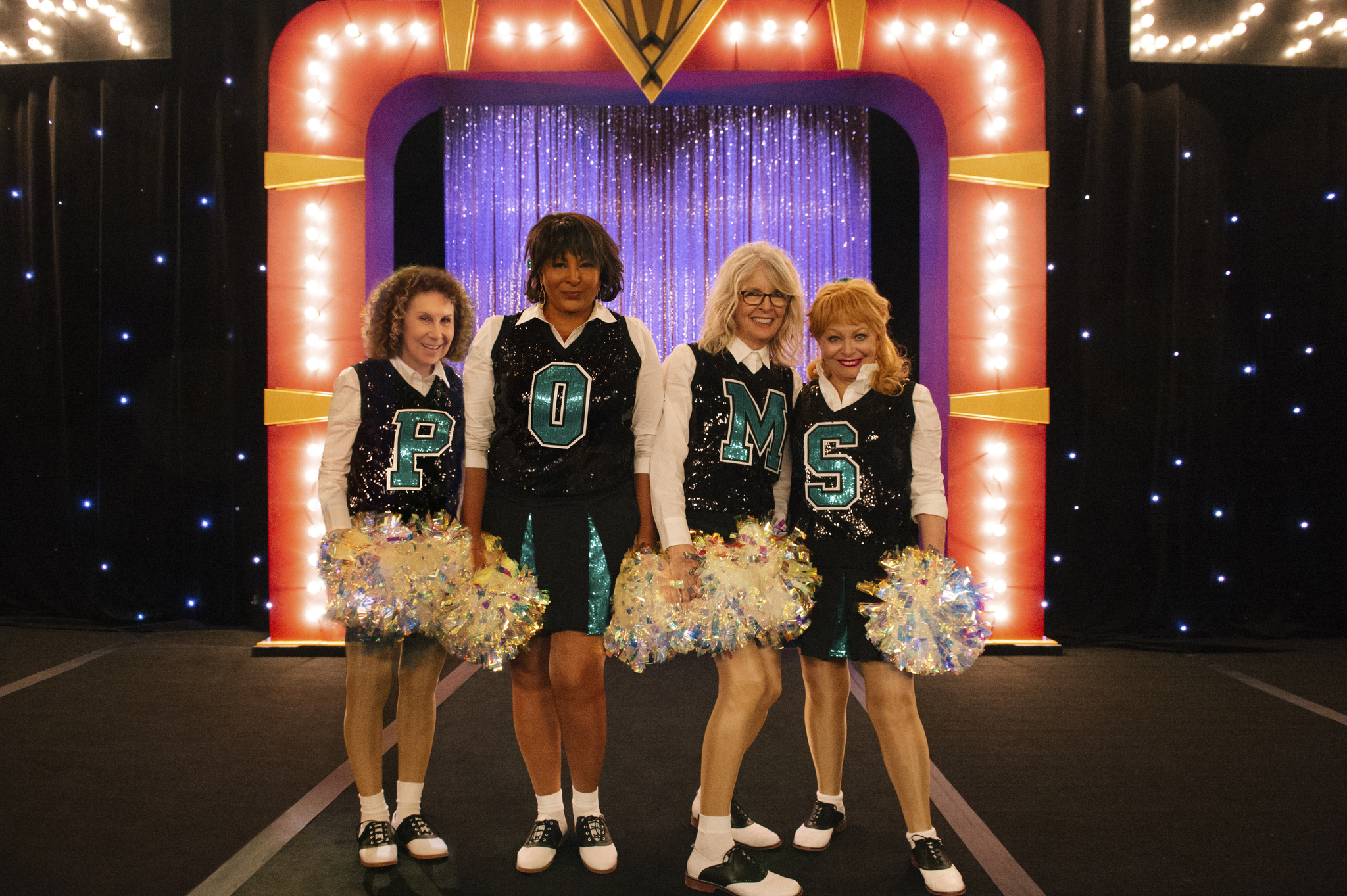
Kellerman: It does make sense, I mean, because in documentary film making, you're still following a narrative essentially, but in this case you're taking a concept and then creating a narrative based on all of these wonderful people that you've met. You do seem to gravitate towards strong 70s/80s women and their stories. Of course Dian Fossey, Billy Jean King, two most notables. Is it a coincidence that you gravitate this way or is it like you're set- I'm only making films about strong females!
Hayes: I'm definitely not set on those, but I agree with you, there's no coincidence in that. I think that I'm always sort of questioned before I do something. There's so many things in the world, does this add anything? Is this doing anything different at all? What is the point? Kind of thing. And I feel like with, because of the way the world has been, naturally there are so many stories about women that aren't told and feel like opportunities and I think that's where tend to find myself and I think that I've heard stories about women who do something kind of heroic courageous, but are interesting and flawed characters is something we haven't had enough of. Like Dian Fossey, that's why I wanted to make that because she is a very controversial and flawed heroin and I think that if she were a man, her legacy would be written in a slightly different way, given who she was and I found that really interesting. Same with Billy Jean King. She is kind of a ... She's a shero, as we called her in the film, but she sort of has become the time and the context in which she was operating. There's a lot more to that story. Yeah, I don't know, so I feel like I could probably keep telling stories about women for the rest of my life and I'd be happy, but at the same time I wouldn't, I don't want to limit myself.
Sometimes my favorite things I've done is geeked out with masculinity. I made this documentary about a father and son who, he was a, he wanted to be a fighter and he couldn't because he was disabled and against all odds he ends up doing it. So, there were kind of, there were maybe more deep cinematic things go on that appeal to me that have to deal with people putting limits on you, arbitrary limits on you that you defy and overcome obstacles, everyday heroism and stuff like that. And it just so happens that a lot of them are women.
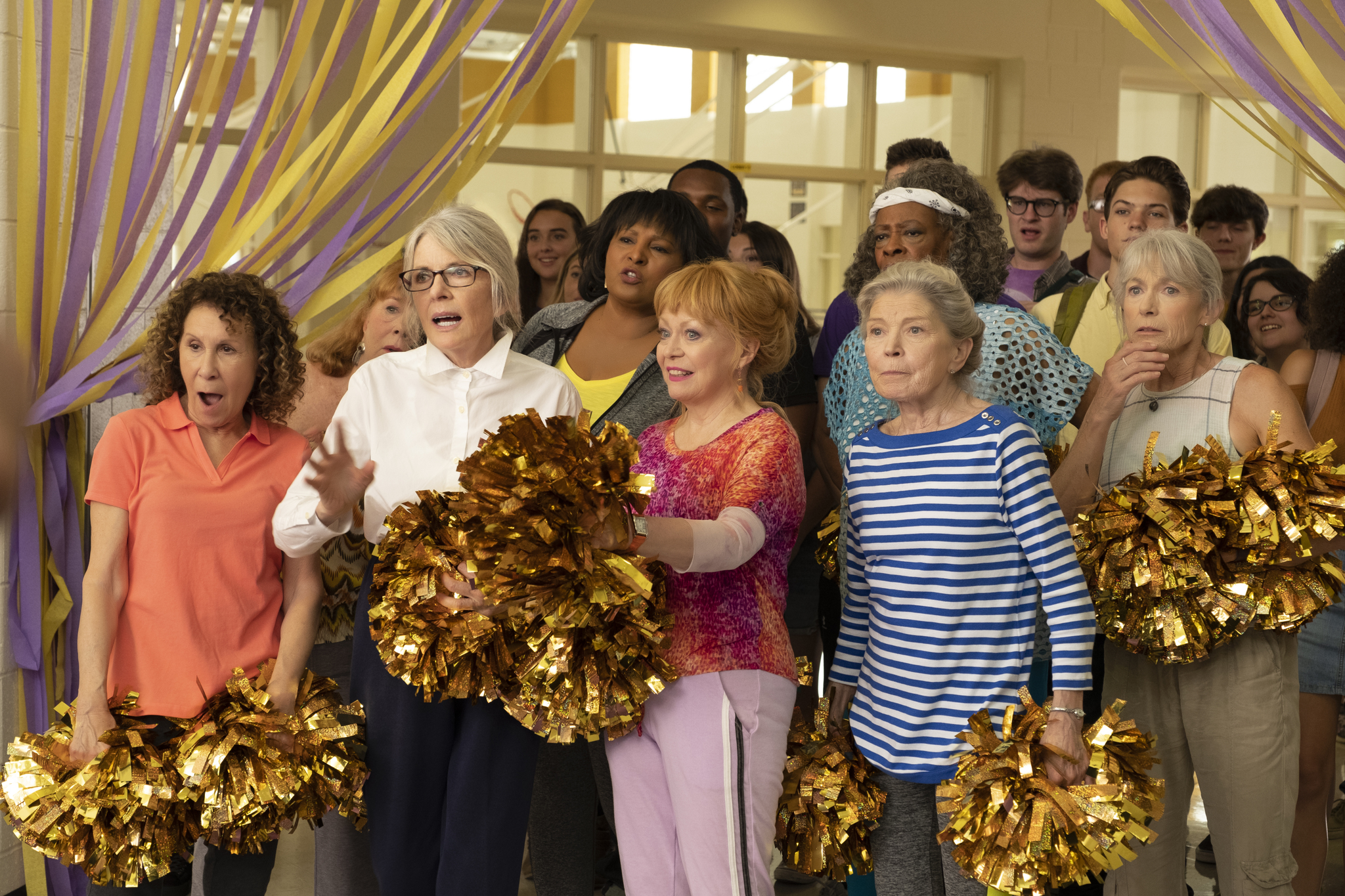
Kellerman: Absolutely. And of course in this instance its fun to see- while those other women are very well known and their stories have been told a number of times- this is pretty unique and it's kind of focusing more on the "every woman" and also grappling on end of life issues.
Hayes: Yeah, I read a book called Somewhere Toward the End by this English writer called Diana Athill who was an editor- a literary editor her entire life- of some of the great authors of the 20th century. She'd never written her own book because women support men, they don't do their own thing. In her seventies she wrote her own book and she wrote about the process of moving herself into an old people- we call them retirement homes, they're like old people's homes in the UK. They're not quite the same as the communities here. But she goes about giving away a lot of her stuff because she was single and it just sort of stunned me on this whole journey of reading and thinking about the end of life.
A very good friend of mine gave me the inspiration of what was going on with Martha because she- my friend's an oncologist in the UK- [Martha’s] obsession is that we not come to terms with aging and we just want to be sequestered away and it's all going to be okay. Then there’s the side that you can have the time of your life and spend the rest of your life at a place like Sun City. The truth is obviously more complicated than that.
It's a sweetness that I wanted to kind of get across in the film and I didn't want to shy away from. The reality is the fact that in those retirement communities death is everywhere, but that's why it's so vibrant and lively. We even had a joke in the script that we cut that- it comes from the real Sun City- where they called the ambulance the taxi. They say "Oh, the taxi is going by!" So it's, I don't know, it's just kind of...
Kellerman: Yeah, you have to find humor, absolutely. I mean, like all the free food and booze at all the wakes!
Hayes: Yes! And it's kind of dark, but it's life and it's real and it's all around you. If you choose to go into a place and just see death and decay, you will. If you go in thinking well, this is a pretty awesome way to live out your days, I wouldn't mind this. You can also have that experience and that's the journey that Martha goes on, right? When she first gets there she just thinks I'm here to die and that's what everyone does and you're all just deluding yourselves. So yeah, it really was important to me to go there, but not let the actors get bogged down by it and not let that become the dominant thing. I hope that comes across. My thing is when we deal with a topic, it should be taken seriously, but it shouldn't use up the whole narrative.
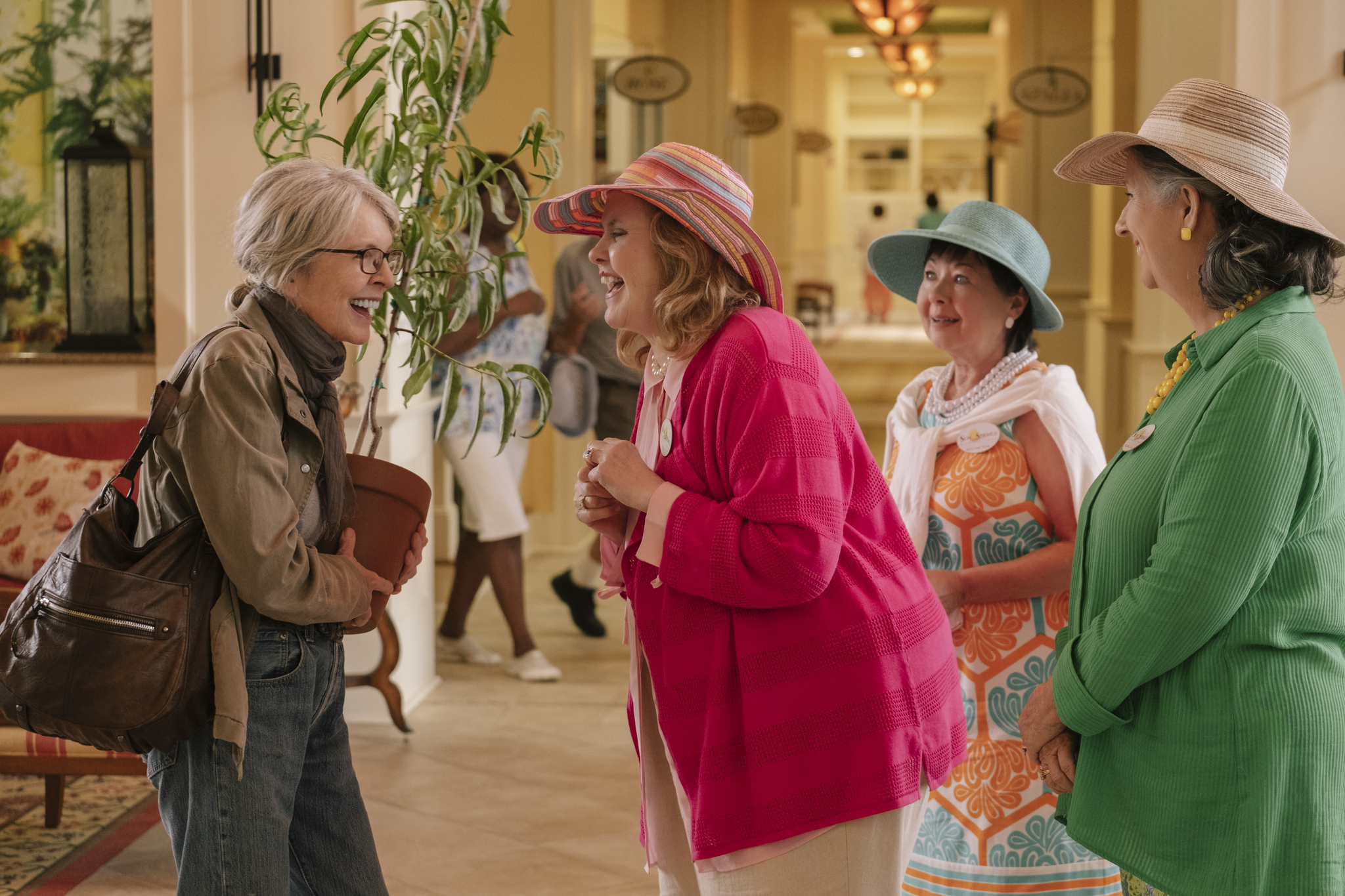
Kellerman: Right. Did you have to woo Diane Keaton? How did that casting, brilliant casting by the way, come about? She can be zany, but it seems a bit out of her comfort zone? Or was it not? And then you have another 70s bad ass icon, Pam Grier, so ...
Hayes: Yeah, I know I'm just clearly obsessed with the seventies. No, in my head, it's just like she would be a dream, and I felt like Martha has this emotional quality I thought [Diane] could really tread that line that we were talking about. She can be hilarious and heart breaking within five seconds flat. She can do that. She can just break your heart and then make you laugh out loud, and there aren't many people here who are able to do that. In terms of wooing her, she was clearly excited by the whole thing. She's so... you never know with someone like Diane. That's what's so wonderful about her. She's quite unpredictable and I think, idiosyncratic, and the idea of a cheerleading movie really appealed to her. She was really into it. From day one, she said its a great under-appreciated American sport. We gotta do this.
But then obviously, its very challenging. She's carrying that dramatic heart in her character- and she's also dancing- and to get that tone... It's so illusive to try and go from broad comedy where you've got those pieces- like the chase, and the cheerleading try outs with the old and the young women sharing the locker room where they're like,"Do you bitches want to rumble," and all of that. How that exists in the same movie as the hospital scene where Jackie and Diane are next to each other being so vulnerable and so raw. It's hard to contain all of that in the same film. I think she just did an amazing job and I think that in that sense it's quite an unusual role.
Kellerman: Yeah, you're right, she totally held it down. And then her co-stars are all amazing. Of course I'm always excited to see Pam Grier in anything. She plays a more demure character in this film.
Hayes: I think she enjoys that as well. I think she really enjoyed the idea that she could have tango as her dance, and she could be pretty and wear a floaty skirt and do her nails and stuff. Because again, yes she's angry, yes she's a badass, yes she's one of the original female action stars, but why can't she also enjoy putting on a floaty skirt? She loved that. She loved getting into her character, Olive, and defying what we expect of her.
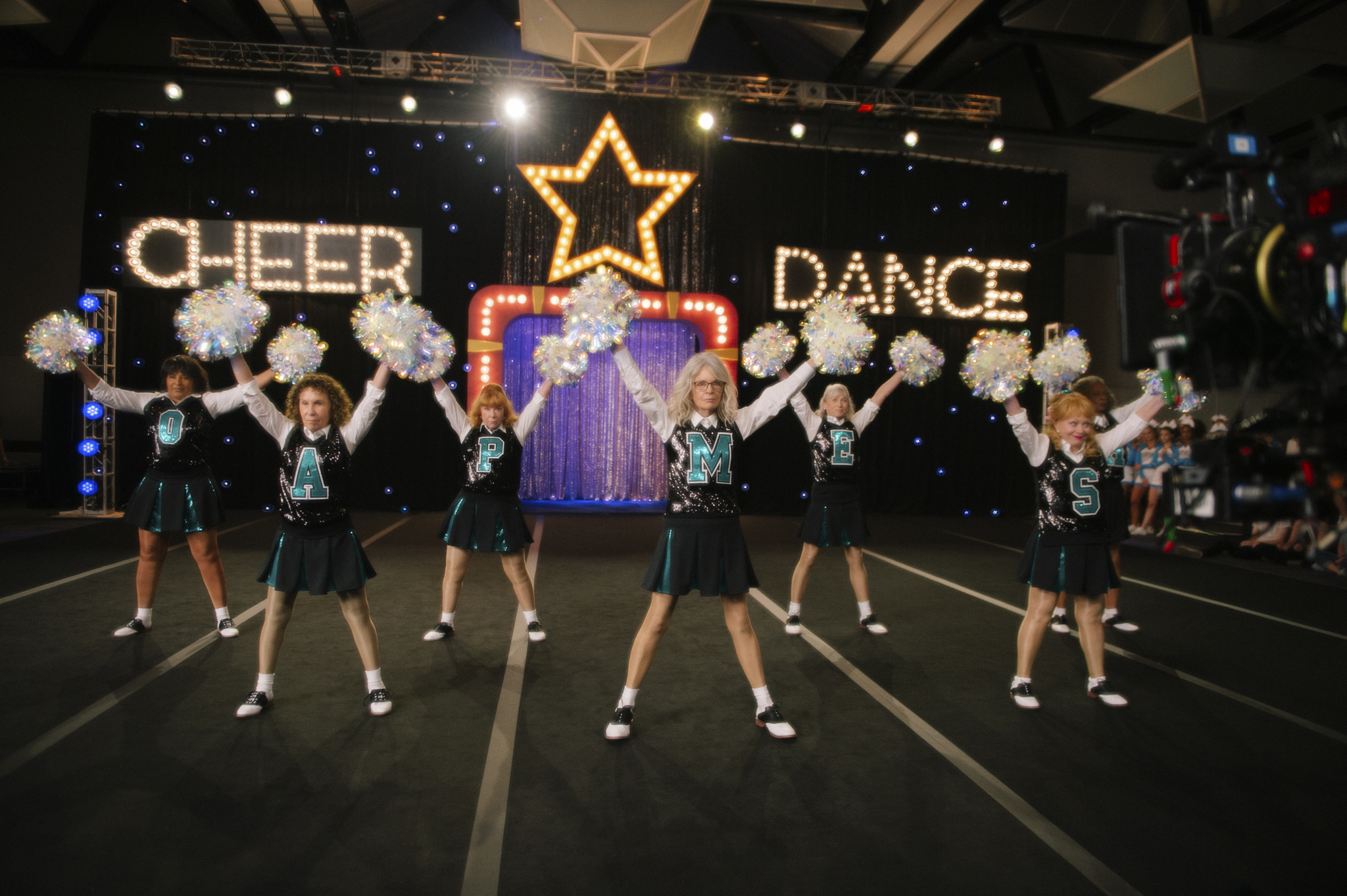
Kellerman: Of course, again, idiosyncratic. Do you have any cheerleading experience yourself? What was that like going into it? Did you have to do research? Did you have consultants? Tell me about the cheerleading side of things.
Hayes: Yeah, I didn't have any experience- we didn't even have cheerleading in England- it's only come about the last few years from America. So, no. But I was an dancer, and I always loved dance movies. Every scene with dancing in a film is nearly always my favorite scene, and so I kind of have that obsession. But when it came to cheerleading I worked with the most incredible choreographer, Marguerite Derricks, who's really at one of the top branches in Hollywood. She's worked with so many actors who are non-dancers over her career that she just has this way of putting them at ease and making them feel like they can do it. And she's choreographed films from Austin Powers to that dance in Little Miss Sunshine- the girl at the end when she does the kind of strip tease. So she's just got something special. She worked with me to come up with an approach to the cheerleading that felt like it was authentic and grounded- not like we were trying to over reach and offer something that felt unreal. Because I wanted it to feel like what these women could really do, being non-dancers and being women of that age. But make it the best it could be and also be true to the history of cheering and how that's changed. So she put a lot into how cheerleading was in the 60s and 70s- more about the transitions and formations rather than the flips and stuff that have come into it in the last twenty years. She then worked with local cheerleading coaches in Atlanta where we filmed to work with the team. So, yeah, it was kind of a good project for research really.
Kellerman: Wow, so you did learn quite a lot about cheerleading and even cheerleading back in the day.
Hayes: Oh my god, I did! I read books about it, I watched competitions. I learned a lot about cheerleading.
Kellerman: You're an authority now, that's terrific, I love it.
Hayes: I still think there's a great documentary to be made on the history of cheerleading because no one has told that story.
Kellerman: Well, there ya go. Your next documentary project, I think, is already in pre-production! So, I look forward to that and I look forward to whatever is next on your plate! I loved POMS- as a former cheerleader myself, it spoke to me.
Hayes: Thank you! And by the way- one final observation- one thing I noticed is that every American woman has a cheerleading story or connection. Every one! No matter how old they are, no matter what they do now in life, this movie taps into something.
Kellerman: It does! Whenever she says she tried out and didn't make it until varsity...that was me! I was like oh my gosh, that was me!
Hayes: But you then did get to perform, right?
Kellerman: Yeah, I did. But I still related. Lots of people will relate in some way. Well thank you so much! I really appreciate your time.
Hayes: Thank you so much!
Kellerman: You have a great day, thank you!
While POMS is definitely not for everyone, I had a blast watching some of my favorite feminist icons embracing a bit of fun and frivolity for a change. The film is somewhat silly at times, but these lighter moments provide a good antidote to the biting commentary on aging that will definitely resonate with any generation. I hope you enjoyed our chat! POMS opens in theater nationwide on 5/10. Thanks for reading!
Rebecca Elliott
Aka Annette Kellerman
